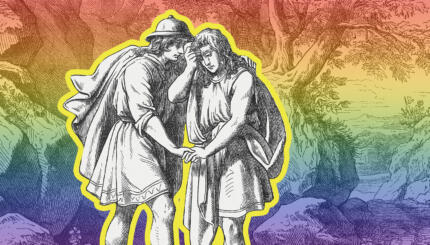Jaime (who uses they/them pronouns) has enjoyed Anshe Emet Synagogue all their life. Yet, on this day in the Rose Crown Minyan service, they felt seen in a new way by their Jewish community and connected, as never before, to Jewish tradition.
It began when a congregational leader asked Jaime if they wanted the honor of being called upon to read from the Torah, aliyah, and was offered a richly designed aliyah card. It contained words that Jamie never expected to see: the option of being called to the Torah using non-gendered ritual language, not just masculine or feminine. At this sacred moment, Jaime was invited to approach the Torah as their whole and authentic self.
The impact of moments like this cannot be overstated. By making such a small shift in language and ritual practice, Anshe Emet brought about a huge shift in the experience of belonging and dignity for their members.
This change is a perfect example of the work that Keshet supports in Jewish communities throughout the country. At Keshet, we believe that belonging and dignity are core principles of Jewish community. When we create spaces that actively affirm and celebrate all people, we’re living Jewish values in the fullest way and are enriched by the presence and wisdom of all members of our communities.
As Rabbi Michael Siegel of Anshe Emet put it, “Berov am hadrat Melech – God’s glory is found in the breadth of our people.” Our communities are at their best when they reflect and celebrate the fullness of the people in them.
Anshe Emet is a model of how to create a community of belonging
Anshe Emet has long been at the forefront of the Conservative movement’s work to build LGBTQ-affirming community. When Keshet offered its first-ever Chicagoland-Keshet Leadership Project, a yearlong program of learning, action planning, and customized coaching for LGBTQ belonging, Anshe Emet eagerly joined.
Through the Leadership Project, Anshe Emet was able to select a team of professional and lay leaders to attend a full-day training summit to learn about LGBTQ identities and history, and create concrete strategies for institutional change work.
As part of the experiential Leadership Summit, Anshe Emet leadership customized an action plan for the congregation. This included training for all staff, creating an LGBTQ affinity group, reviewing policies, procedures, and forms, and making changes to rituals, including the design of the gender-affirming aliyah cards that would so deeply affect Jaimie in the future.
The Rose Crown Minyan, lay-led within the larger Anshe Emet community, decided to take on the process of developing gender-affirming language and aliyah cards for their Torah service. Through the process of making this small shift, Anshe Emet uncovered core lessons about the work for LGBTQ equality and belonging and are eager to share their learnings with other congregations engaging in the same work.
Lesson 1: Gather Resources
There are many resources that already exist to help communities develop LGBTQ-affirming practices and policies. Rather than seek to develop new language, Anshe Emet immediately organized a committee through the Rose Crown Minyan to find out how other Jewish organizations pursued a similar goal and the resources they utilized. Two relevant guides were discovered by the committee: Fort Tryon Jewish Center’s all-gender Torah service liturgy and Hadar’s gabbai sheets.
Lesson 2: Work in Your Community
Because no two communities are alike, no two communities will take the same path towards the core values of dignity and belonging. Sustained change happens when the voices of the LGBTQ community are centered and the broader community learns together and is part of the process of change. Within the Anshe Emet community, the decision was unanimously in favor of implementing a gender-neutral option for calling up people for aliyot.
While it was immediately clear to the community that all members deserved to be called to the Torah with language that was affirming, the community had the opportunity to learn together and decide together how best to implement this. This generated important questions, such as: Should all people be called to the Torah using non-gendered language? Should a non-gendered option be presented along with options for masculine and feminine language? What’s the best way to invite community members to choose the most affirming language and communicate that to service leaders?
Lesson 3: Keep Learning
Through a process of learning and conversation, the community determined that the most affirming process was to offer three options: masculine, feminine, and non-gendered. The community added that any person could choose any language for any reason—and that one need not select the same one with every aliyah.
The committee then met with several of Anshe Emet’s most regular gabbaim to discuss ways to implement this significant and progressive change. With the Fort Tryon and Hadar materials as guides, the help of a veteran gabbai, and the skills of a talented graphic designer, new gender-neutral aliyah cards and gabbai sheets were created. By using pre-printed aliyah cards, those called to the Torah could easily indicate which language the gabbai should use.
Lesson 4: Be Ready for Change
This vitally important work did not cease during COVID-19. During a year of immense change, congregations everywhere had to find new and creative ways to live out their core values. Even though congregants at Anshe Emet couldn’t stand near each other, each person was called to the Torah seamlessly using the correct names and pronouns. Anshe Emet leadership undertook a substantial effort to record and share the preferences of each member.
Today, at Anshe Emet, equality, inclusion, and belonging are core values that are expressed in a multitude of ways. However, leadership recognizes the need to continue discussions on embracing LGBTQ people, Jews of color, families of every kind, and individuals at all ages and stages of life and observance. Ongoing learning is at the core of making the values of equality, inclusion, and belonging into a reality.
Download the Anshe Emet aliyah cards used in the Rose Crown Minyan, by clicking here (PDF). This magnificent aliyah card is an expression of a vision based upon the core Jewish idea that each human being is created in the Divine Image, worthy of dignity and celebration.
Join a Keshet Leadership Project
These lessons and values can strengthen all of our communities. To give leaders the tools, skills, and confidence in this critical area, Keshet partners with leaders of national and local Jewish groups. This includes synagogues, day schools, JCCs, youth groups, and summer camps.
The Leadership Project kicks off with a dynamic, experiential Leadership Summittthat builds the capacity of leaders and their institutions to create LGBTQ-affirming environments for all community members. Keshet’s expert facilitators train participants on concrete strategies and tools for inclusion and participants leave with a robust implementation plan. Each institution receives a year of follow-up coaching and consulting to achieve LGBTQ equality. Click for more information.



